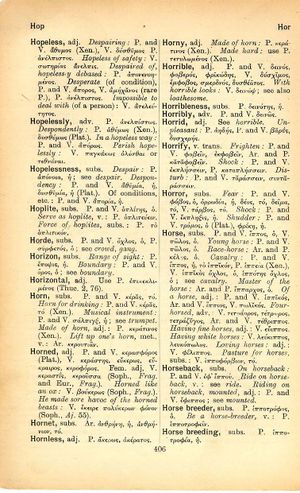horizon
τὴν πολιὴν καλέω Νέμεσιν πόθου, ὅττι δικάζει ἔννομα ταῖς σοβαραῖς θᾶσσον ἐπερχομένη → I call gray hairs the Nemesis of love, because they judge justly, coming sooner to the proud
English > Greek (Woodhouse)
substantive
range of sight: P. ἔποψις, ἡ.
boundary: P. and V. ὅρος, ὁ; see boundary.
Latin > English (Lewis & Short)
hŏrīzon: ontis, m., = ὁρίζων (sc. κύκλος or ἀήρ).
I The horizon (pure Lat. finiens and finitor), Macr. Somn. Scip. 1, 15 fin.; id. S. 7, 14 fin.; Hyg. Astr. 1, 4.—
II A line drawn through the centre of a sundial, Vitr. 9, 8.
Latin > French (Gaffiot 2016)
hŏrizōn, ontis, m. (ὁρίζων), horizon [t. d’astron.] : Hyg. Astr. 1, 4 ; v. finitor || horizon [borne de la vue] : Macr. Scip. 1, 15, 17 || horizon [d’un cadran solaire] : Vitr. Arch. 9, 7, 6.
Latin > German (Georges)
horizōn, ontis, Akk. ontem, onta, m. (ὁρίζων = begrenzend), I) die Kreislinie, die den Himmel in zwei gleiche Teile teilt u. bestimmt, was wir sehen u. nicht sehen können, der Horizont, Gesichtskreis (rein lat. finiens circulus u. bl. finiens, finitor), Sen. nat. qu. 5, 17, 3. Manil. 1, 665. Macr. somn. Scip. 1, 15, 17. Hyg. astr. 1, 4: horizon vel finitor, Mart. Cap. 8. § 826. – II) bei der Sonnenuhr, die durch den Mittelpunkt gezogene Linie, die den Mittagskreis in zwei gleiche Halbkreise teilt, der Horizont, Vitr. 6, 1, 5 u. 9, 7, 6.
Latin > English
horizon horizontos/is N M :: horizon; line on celestial sphere corresponding to horizon

